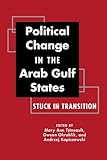Political change in the Arab Gulf States : stuck in transition / edited by Mary Ann Tétreault, Gwenn Okruhlik, Andrzej Kapiszewski.
Tipo de material: TextoEditor: Boulder, Colo. : Lynne Rienner Publishers, 2011Descripción: x, 369 páginasTipo de contenido:
TextoEditor: Boulder, Colo. : Lynne Rienner Publishers, 2011Descripción: x, 369 páginasTipo de contenido: - texto
- no mediado
- volumen
- 1588267520
- 9781588267528
- 320.9536 P769 2011
| Tipo de ítem | Biblioteca actual | Colección | Signatura topográfica | Estado | Notas | Fecha de vencimiento | Código de barras | Reserva de ítems | |
|---|---|---|---|---|---|---|---|---|---|
| Libro | Biblioteca Central | Colección General | 320.9536 P769 2011 (Navegar estantería(Abre debajo)) | Disponible | GEN | 33409002748451 |
Incluye bibliografía.
1. Twenty-First-Century Politics in the Arab Gulf States ---- Part I. COUNTRY CASES. 2. Reweaving the Myth of Bahrainʹs Parliamentary Experience --- 3. Shi´ite Parties and the Democratic Process in Iraq --- 4. Bottom-Up Democratization in Kuwait --- 5. Oman Faces the Twenty-First Century --- 6. Political Reform in Qatar --- 7. The Saudi Shi´a and Political Reform in Saudi Arabia --- 8. Economics Trumps Politics in the United Arab Emirates ---- Part II. THE REGIONAL CONTEXT. 9. Women in Civic and Political Life: Reform Under Authoritarian Regimes --- 10. New Media: In Search of Equilibrium --- 11. Permanent Interests, Variable Policies: The United States in the Gulf --- 12. Defense Cooperation: Beyond Symbolism? Part III. CONCLUSION. 13. Juxtapositions and Sticking Points.
Although reform movements have been prominent in varying degrees in most Middle Eastern countries for some time, the cascade of events following the overthrow of Saddam Hussein has generated new pressures for democratization throughout the Arab World. Political Change in the Arab Gulf States explores the politics influencing the volatile situation in the region, as well as specific measures devised by regimes in power to adjust to the challenges of the current environment. The authors first focus on the politics of seven Gulf states: Bahrain, Iraq, Kuwait, Oman, Qatar, Saudi Arabia, and the UAE. They then consider four forces that are shaping current political attitudes and behavior across the region: movements to broaden womenʹs political participation, the media, current US national security policy, and regional defense cooperation. The result is an up-to-date assessment of the prospects for political reform in the Gulf and an important corrective to a simplistic domino theory of democratization. -- Publisher description.
No hay comentarios en este titulo.
